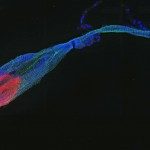Link to Pubmed [PMID] – 29376030
Link to HAL – pasteur-01849816
Link to DOI – 10.3389/fcimb.2017.00508
Front Cell Infect Microbiol 2017 ; 7(): 508
Anopheles female mosquitoes can transmit Plasmodium, the malaria parasite. During their aquatic life, wild Anopheles mosquito larvae are exposed to a huge diversity of microbes present in their breeding sites. Later, adult females often take successive blood meals that might also carry different micro-organisms, including parasites, bacteria, and viruses. Therefore, prior to Plasmodium ingestion, the mosquito biology could be modulated at different life stages by a suite of microbes present in larval breeding sites, as well as in the adult environment. In this article, we highlight several naturally relevant scenarios of Anopheles microbial pre-exposure that we assume might impact mosquito vectorial competence for the malaria parasite: (i) larval microbial exposures; (ii) protist co-infections; (iii) virus co-infections; and (iv) pathogenic bacteria co-infections. In addition, significant behavioral changes in African Anopheles vectors have been associated with increasing insecticide resistance. We discuss how these ethological modifications may also increase the repertoire of microbes to which mosquitoes could be exposed, and that might also influence their vectorial competence. Studying Plasmodium-Anopheles interactions in natural microbial environments would efficiently contribute to refining the transmission risks.




